Lesson 24 Writing a Poem教学设计
- 格式:doc
- 大小:98.02 KB
- 文档页数:6
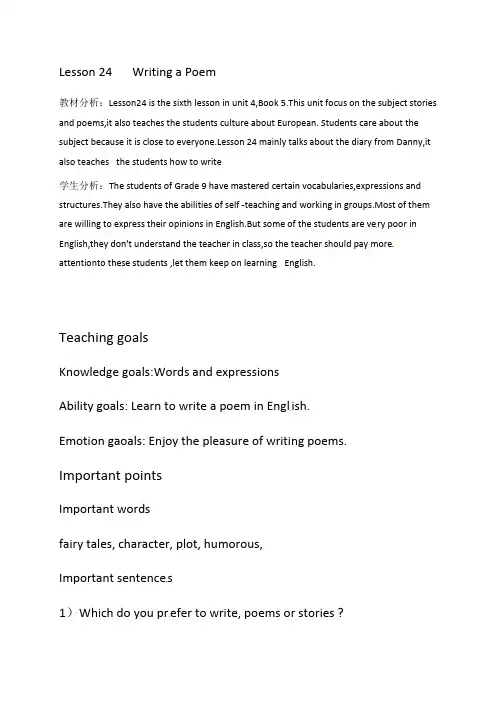
Lesson 24 Writing a Poem教材分析:Lesson24 is the sixth lesson in unit 4,Book 5.This unit focus on the subject stories and poems,it also teaches the students culture about European. Students care about the subject because it is close to everyone.Lesson 24 mainly talks about the diary from Danny,it also teaches the students how to write学生分析:The students of Grade 9 have mastered certain vocabularies,expressions and structures.They also have the abilities of self -teaching and working in groups.Most of them are willing to express their opinions in English.But some of the students are very poor in English,they don't understand the teacher in class,so the teacher should pay more attentionto these students ,let them keep on learning English.Teaching goalsKnowledge goals:Words and expressionsAbility goals: Learn to write a poem in Engl ish.Emotion gaoals: Enjoy the pleasure of writing poems.Important pointsImportant wordsfairy tales, character, plot, humorous,Important sentences1)Which do you pr efer to write, poems or stories ?2)Then my teacher encouraged me to write a humorous poem because I am always sayingfunny things.3)But it was too hard to write that poem.Difficult points:prefer 的用法Teaching methods: listening reading pairwork groupwork Teaching stepsStep 1.Greetings.(Lead in)Step 2. Think about it.1. Which do you prefer to write, poems or stories?2. Why do you think Danny was afraid to write a poem?Present the Learning Aims and TasksMaster the words: fairy tales, character, plot, humorous,Master the sentences:1)Which do you prefer to write, poem s or stories ?2)Then my teacher encouraged me to writ e a humorous poem because I am always saying funny things.。
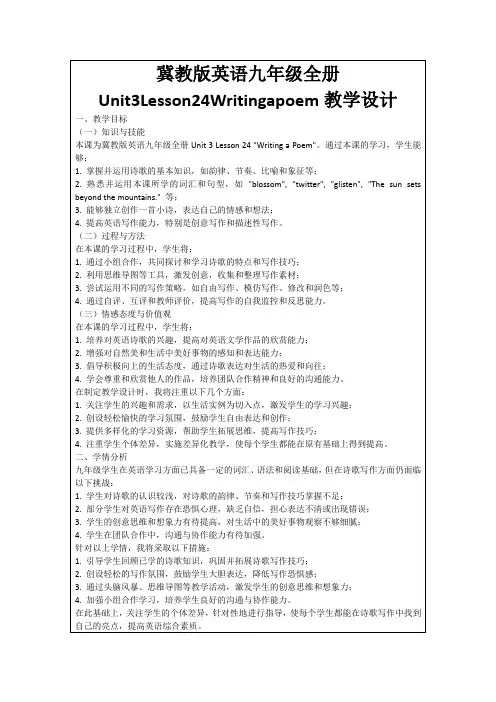
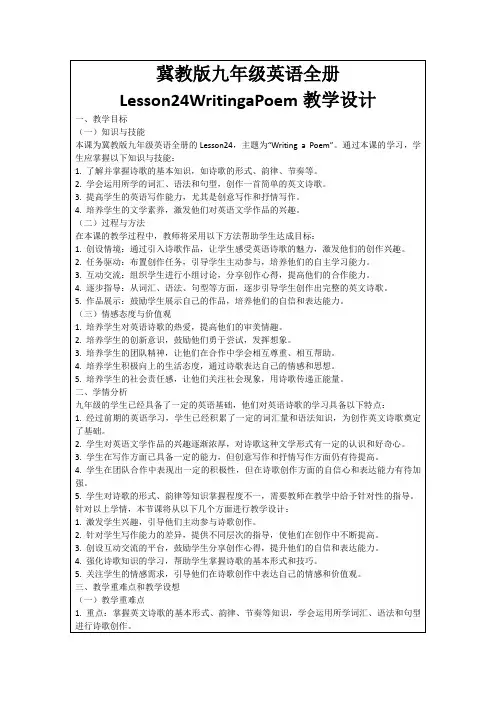
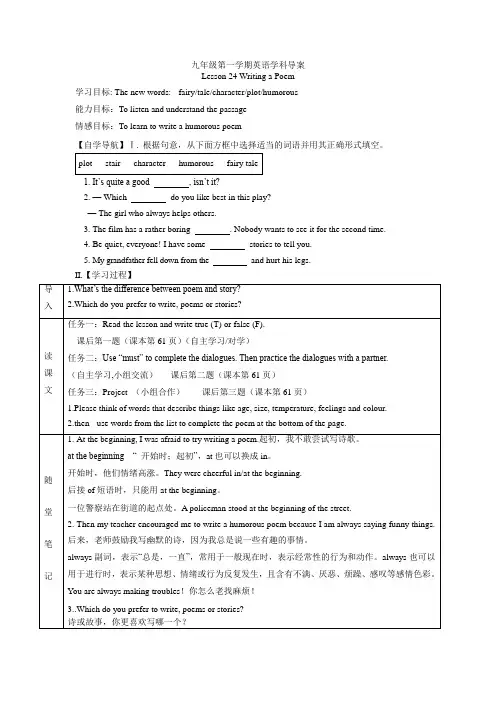
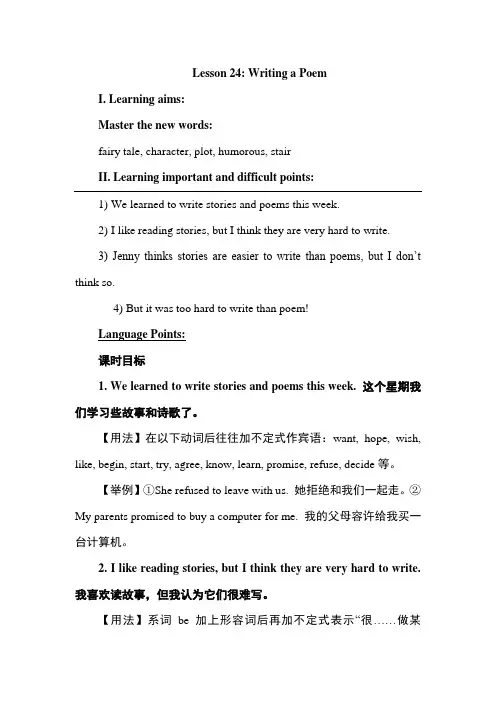
Lesson 24: Writing a PoemI. Learning aims:Master the new words:fairy tale, character, plot, humorous, stairII. Learning important and difficult points:1) We learned to write stories and poems this week.2) I like reading stories, but I think they are very hard to write.3) Jenny thinks stories are easier to write than poems, but I don’t think so.4) But it was too hard to write than poem!Language Points:课时目标1. We learned to write stories and poems this week. 这个星期我们学习些故事和诗歌了。
【用法】在以下动词后往往加不定式作宾语:want, hope, wish, like, begin, start, try, agree, know, learn, promise, refuse, decide等。
【举例】①She refused to leave with us. 她拒绝和我们一起走。
②My parents promised to buy a computer for me. 我的父母容许给我买一台计算机。
2. I like reading stories, but I think they are very hard to write. 我喜欢读故事,但我认为它们很难写。
【用法】系词be 加上形容词后再加不定式表示“很……做某事〞,其中的不定式作状语。
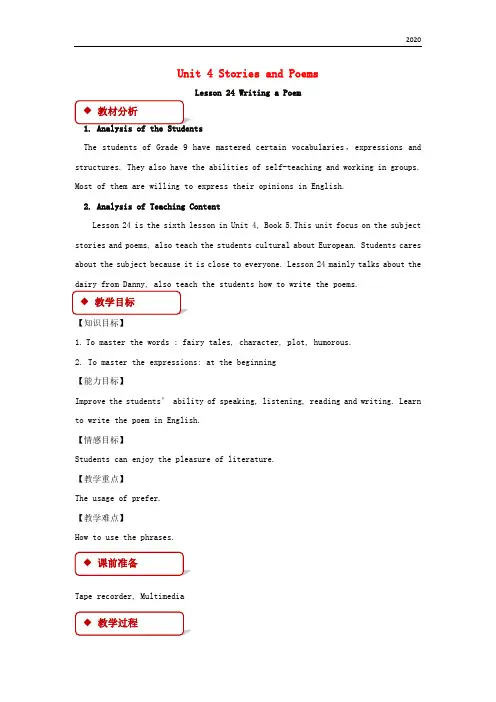
Unit 4 Stories and PoemsLesson 24 Writing a PoemThe students of Grade 9 have mastered certain vocabularies,expressions and structures. They also have the abilities of self-teaching and working in groups. Most of them are willing to express their opinions in English.2. Analysis of Teaching ContentLesson 24 is the sixth lesson in Unit 4, Book 5.This unit focus on the subject stories and poems, also teach the students cultural about European. Students cares about the subject because it is close to everyone. Lesson 24 mainly talks about the dairy from Danny, also teach the students how to write the poems.【知识目标】1.To master the words : fairy tales, character, plot, humorous.2. To master the expressions: at the beginning【能力目标】Improve the students’ ability of speaking, listening, reading and writing. Learn to write the poem in English.【情感目标】Students can enjoy the pleasure of literature.【教学重点】The usage of prefer.【教学难点】How to use the phrases.Tape recorder, MultimediaStep 1. Warm-upFree talk: Look at the picture, what happened?Step 2. Presentation1.Read the passage and ask the questions:(1)What’s the difference between poem and story?(2)Does Danny afraid to write a poem?2.Think about it: Which do you prefer to write? Poems or stories? Why? What about Danny?3.Explain the new words.4.Read the lesson and write true (T) or false (F).(1)Danny learned how to write songs last week. ( )(2)Danny likes reading stories. ( )(3)Danny thinks stories are easier to write. ( )nguage points:at the beginning “开始时;起初”,at也可以换成in。
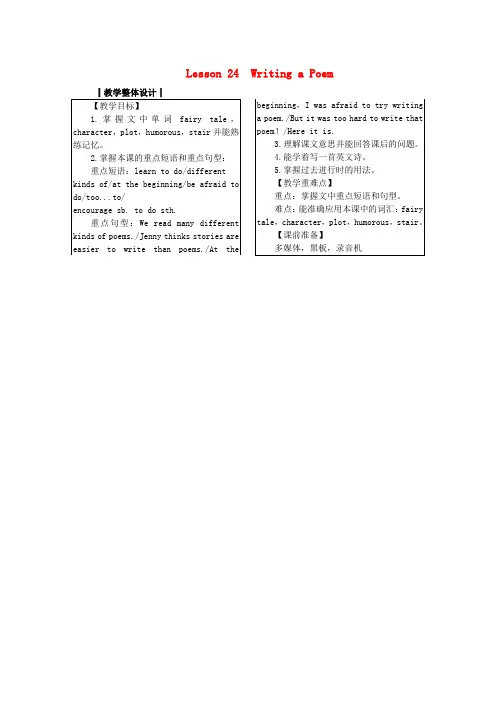
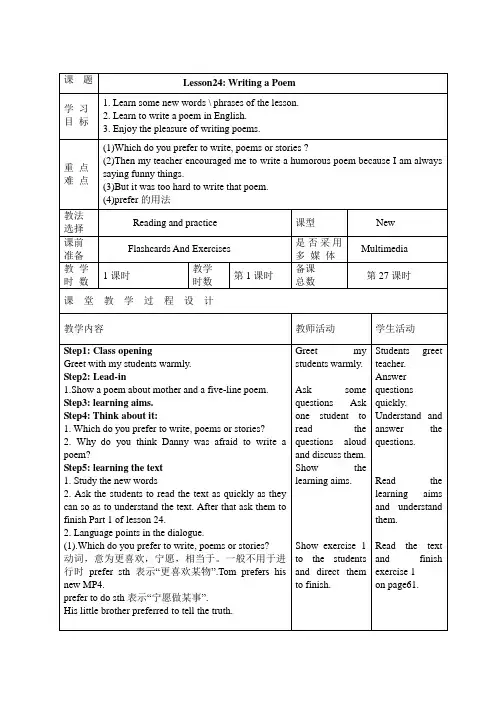
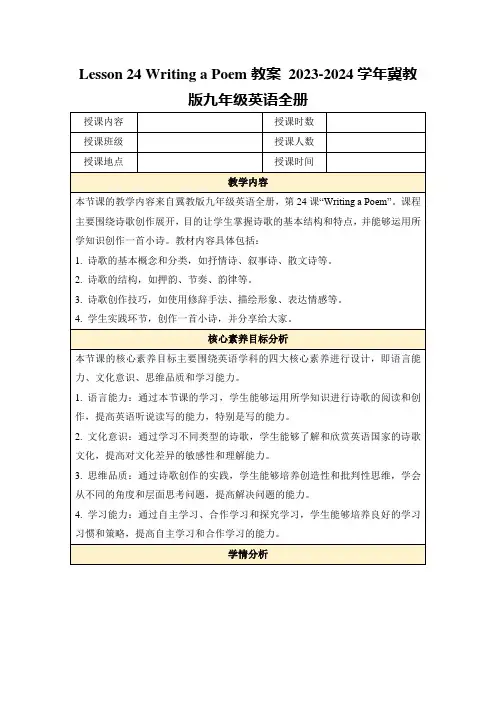
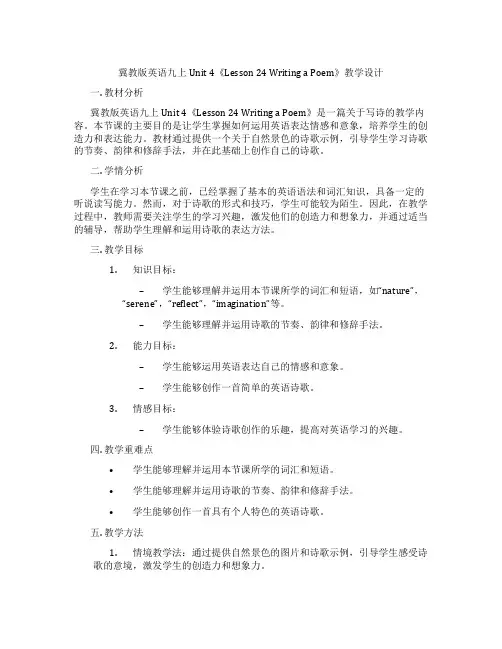
冀教版英语九上Unit 4《Lesson 24 Writing a Poem》教学设计一. 教材分析冀教版英语九上Unit 4《Lesson 24 Writing a Poem》是一篇关于写诗的教学内容。
本节课的主要目的是让学生掌握如何运用英语表达情感和意象,培养学生的创造力和表达能力。
教材通过提供一个关于自然景色的诗歌示例,引导学生学习诗歌的节奏、韵律和修辞手法,并在此基础上创作自己的诗歌。
二. 学情分析学生在学习本节课之前,已经掌握了基本的英语语法和词汇知识,具备一定的听说读写能力。
然而,对于诗歌的形式和技巧,学生可能较为陌生。
因此,在教学过程中,教师需要关注学生的学习兴趣,激发他们的创造力和想象力,并通过适当的辅导,帮助学生理解和运用诗歌的表达方法。
三. 教学目标1.知识目标:–学生能够理解并运用本节课所学的词汇和短语,如“nature”,“serene”,“reflect”,“imagination”等。
–学生能够理解并运用诗歌的节奏、韵律和修辞手法。
2.能力目标:–学生能够运用英语表达自己的情感和意象。
–学生能够创作一首简单的英语诗歌。
3.情感目标:–学生能够体验诗歌创作的乐趣,提高对英语学习的兴趣。
四. 教学重难点•学生能够理解并运用本节课所学的词汇和短语。
•学生能够理解并运用诗歌的节奏、韵律和修辞手法。
•学生能够创作一首具有个人特色的英语诗歌。
五. 教学方法1.情境教学法:通过提供自然景色的图片和诗歌示例,引导学生感受诗歌的意境,激发学生的创造力和想象力。
2.任务型教学法:通过小组合作和分享,培养学生的团队合作精神和交流能力。
3.反馈与评价:教师及时给予学生反馈和评价,鼓励学生积极参与,提高自信心。
六. 教学准备1.教学材料:冀教版英语九上教材、多媒体课件、自然景色图片、诗歌示例。
2.教学设备:投影仪、计算机、音响设备。
七. 教学过程1.导入(5分钟)–教师通过展示自然景色的图片,引导学生观察和描述,激发学生的创造力和想象力。
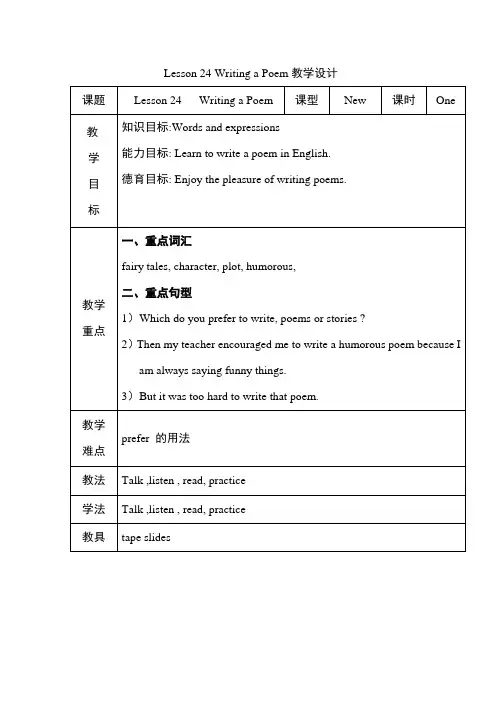
九年级英语上册Unit4 Stories and poems Lesson24 Writing a Poem教学设计新版冀教版一. 教材分析冀教版九年级英语上册Unit4 Stories and poems Lesson24 Writing a Poem是一个写作课。
本课的主题是学习写一首诗,通过欣赏和分析不同类型的诗歌,让学生掌握诗歌的基本结构和修辞手法,并能够创作一首属于自己的诗歌。
教材内容丰富,包括不同风格的诗歌示例、诗歌创作技巧指导和学生的创作实践。
二. 学情分析九年级的学生已经具备了一定的英语基础,能够理解和运用一些基本的英语句型和词汇。
然而,诗歌创作对于他们来说可能是一个新的挑战,需要引导学生充分发挥想象力和创造力。
此外,学生可能对诗歌的修辞手法和结构有一定的陌生感,因此需要教师在教学中进行详细的讲解和示范。
三. 教学目标1.能够理解并运用诗歌中的常用词汇和句型。
2.能够欣赏并分析不同类型的诗歌,理解诗歌的基本结构和修辞手法。
3.能够创作一首属于自己的诗歌,展示想象力和创造力。
4.培养对英语诗歌的兴趣和鉴赏能力。
四. 教学重难点1.诗歌中的修辞手法和结构的理解。
2.学生创作诗歌的能力的培养。
五. 教学方法1.任务驱动法:通过设定具体的写作任务,引导学生主动学习和参与。
2.案例分析法:通过分析不同类型的诗歌案例,让学生理解和掌握诗歌的基本结构和修辞手法。
3.互动式教学法:通过教师与学生、学生与学生之间的互动,激发学生的学习兴趣和创造力。
六. 教学准备1.准备不同类型的诗歌案例,包括示例和分析。
2.准备诗歌创作技巧的指导资料。
3.准备写作任务的要求和评价标准。
七. 教学过程1.导入(5分钟)通过展示一首美丽的英文诗歌,引发学生对诗歌的兴趣,并引导学生思考诗歌的特点和魅力。
2.呈现(10分钟)呈现不同的诗歌案例,让学生欣赏和分析。
引导学生关注诗歌的主题、结构、修辞手法等,并通过讨论和分享,让学生表达对诗歌的理解和感受。
Lesson 24 Writing a PoemTeaching Content:Mastery words and expressions: humorous,fairy tale,at the beginningOral words and expressions: fairy,tale,character,plotTeaching Aims:1.Grasp mastery words and patterns.2.Know more about the foreign culture.Teaching Important Points:1.Master words and expressions2.Learn the differences between Chinese and foreign poetry.Teaching Difficult Points:Write a letter with what we learn in this unit.Teaching Preparation: picturesTeaching Aids: audiotape,flashcards,picturesType of lesson: new lessonTeaching Procedure:Step1: Study new words of the lesson. Then show the type of the letter. Let the students sum how to write a letter. Pay attention to the written style of the envelope.Step2: Think About ItWhich do you prefer to write,poems or stories?Why do you think Danny was afraid to write a poem?Step 3: Listening taskListen to the tape and fill in the blanks.1. _______ is a beautiful way to express thoughts and feelings.2. Danny’s teacher says Danny’s always saying _______ things.Let the students listen to the tape and finish the listening task in class in oral.Step 4: Read the text and answer the following questions:1.Does Danny think it is hard to write a poem?2.Did Li Ming write back to Danny?Ask the students scan the text and answer the questions.Step 5: Practice Write a letter to your friends about what we learn in this unit. The teacher encourages them to write a poem to their friend,too. It’s hard,so they can choose any topic that they like. They only write for friends. We don’t need to demand too much.Step5: Come to “LET’S DO IT”.1) Finish Exercises 1 and 2 on Page 61. Encourage students to finish them independently,then check as a class.2) Comet to the project. In a small group,write a poem according to the demands.1.First,choose a word your group like. They can choose any word that they like. Because the task is to begin a poem with the letters in this word,everyone can write a word on a piece of paper. Then they can choose one from these.e each letter in this word to begin a line of our poem. Everyone in the group can write different poem according to the word. Then they can exchange their poems and give advice to each other.3.Make a poster to display your poems on the wall. It takes some time to design the poster.4.Which one do you think is the best? Give your reasons.Let the students choose the best poem that they like best and give their reasons in front of the class.Step6: HomeworkWrite a poem about something you like.。
Unit 4 Lesson 24 Writing a Poem【学习目标】1.通过连一连、读一读练习,能记住并正确使用本课时的重点单词和重点短语。
2.通过写作训练,能够掌握过去进行时的用法,并形成良好的写作能力。
3.通过合作探究,加深对诗歌的兴趣,并锻炼团队合作能力。
【预习导学】一、单词速记1.仙子;小精灵2.故事;童话3.人物;特点4.(小说、戏剧当中)情节5.幽默的;诙谐的二、短语速记三、想一想1.Danny他们这周在学校学习了什么?______________________________________________________________2.开始Danny害怕什么?______________________________________________________________3.通过句子“We learned to write stories and poems this week.”,我们学习了短语learn to do...的用法。
举一反三,你可以用这个短语说一些句子吗?______________________________________________________________【答案】一、1.fairy2.tale3.character4.plot5.humorous二、三、1.They learned to write stories and poems. They also learned about fables and fairy tales.2.He was afraid to try writing a poem.3.He learned to play the piano at the age of five.【合作探究】任务驱动一单词学习1.重新组合单词。
(1)aryif(2)leat(3)acarterhc(4)olpt(5)rosoumuh2.阅读训练。
UNIT 4 Stories and PoemsLesson 24 Writing a Poem教案I. Teaching Aims:1. Learn and master new words, phrases and sentence patterns.2. Enable the students to know how to write a poem.3. Develop the students’ reading and listening abilit y.II. Teaching Main Points:1. Improve the students’ reading, listening ability.2. Master some phrases and sentence patterns.III. Teaching Difficult Points:1. To read and listen effectively.2. Phrases and sentence patterns.IV. Teaching Methods:1. Fast reading to find out the general information about the passage.2. Question-and-answer activities to help the students to go through the whole passage.3. Individual, pair and group work to make every student work in class.V. Teaching Aids:The blackboard, computer, projector, audiotape, flashcards, picturesVI. Teaching Procedures:Step 1 GreetingStep 2 Revision and lead-inAsk some questions:1. Do you remember what we had learnt last class ?2. What is it?3. Can you tell us something about a poem?4. What is the character of a poem??Step 3 Presentation for readingAsk a question:Do you want to know the meaning of this poem?Step 4 Fast reading1. Give 2 minutes to read passage quickly.2. Answer questions on page 61.3. Repeat the right answer and write them on the blackboard.Step 5 Careful reading1. Explain some main phrases and sentence patterns.2. Give 4 minutes to read passage carefully and do the exercises in pairs.3. Check the answer: Ask a team of students do it one by one.Step 6 Practice1. Summarize the main ideas of the passage.2. Divide students to groups to discuss the passage.3. Make a competition: List the information you had remember about a poem, the more the better. Step 7 Consolidation and summary1. Emphasize the phrases and sentence patterns.2. Retell some information about this fairy tale.VII. Homework1. Write down the new words on your notebook.2. Use new words to make sentences.3. Preview Lesson 25.。
Unit 4 Stories and PoemsLesson 24 Writing a PoemThe students of Grade 9 have mastered certain vocabularies,expressions and structures. They also have the abilities of self-teaching and working in groups. Most of them are willing to express their opinions in English.2. Analysis of Teaching ContentLesson 24 is the sixth lesson in Unit 4, Book 5.This unit focus on the subject stories and poems, also teach the students cultural about European. Students cares about the subject because it is close to everyone. Lesson 24 mainly talks about the dairy from Danny, also teach the students how to write the poems.【知识目标】1.To master the words : fairy tales, character, plot, humorous.2. To master the expressions: at the beginning【能力目标】Improve the students’ ability of speaking, listening, reading and writing. Learn to write the poem in English.【情感目标】Students can enjoy the pleasure of literature.【教学重点】The usage of prefer.【教学难点】How to use the phrases.Tape recorder, MultimediaStep 1. Warm-upFree talk: Look at the picture, what happened?Step 2. Presentation1.Read the passage and ask the questions:(1)What’s the difference between poem and story?(2)Does Danny afraid to write a poem?2.Think about it: Which do you prefer to write? Poems or stories? Why? What about Danny?3.Explain the new words.4.Read the lesson and write true (T) or false (F).(1)Danny learned how to write songs last week. ( )(2)Danny likes reading stories. ( )(3)Danny thinks stories are easier to write. ( )nguage points:at the beginning “开始时;起初”,at也可以换成in。
Lesson 24 Writing a Poem陇西县福星初级中学栾维君教学目标1.拼读并识记本课单词和短语;2.熟练应用try to do sth. 与try doing sth.3.学习新单词fairy, tale, plot, character, humorous4.掌握try, must用法,及否定疑问句5.提高学生的听说,阅读能力6.培养学生良好的写作习惯学情分析学生为九年级学生,已掌握了一定的词汇量及语法知识,可以进行一定的提高训练。
重点难点1.情态动词must的用法2.英文小诗歌写作的初步尝试教学过程第一学时教学活动活动1【讲授】教学设计一、温故互查The story is about a ________ giant who later changed. _________, he didn’t like the children playing in his garden. The following spring, his garden was _______ with snow, and the cold winds _____ the birds _____. He was very sad and he didn’t know why spring hadn’t come. One day, to his________, he saw some children coming back to his gardenthrough a _____ in the wall, and spring also returned. The giant made a ________. He ______________ the wall. _____________ that day, the giant’s garden has been a children’s playground.二、设问导读1. Lead-in2. New words: fairy, tale, character, plot, humorous3. Listening (Listen and fill in the blanks)I like _______ stories, but they are very _____ to write. I think a good story must have great ________ and an _________ _____. Jenny th inks stories are _______ to write than _____, but I don’t think so.4. Reading (Read the text and write true or false)Danny learned how to write songs last week. ( )Danny likes reading stories. ( )Danny thinks stories are easier to write. ( )5.合作探究--- Language PointsDiscuss the following three language points in groups and write down key piontsI tried to write one about my favourite place beside a lake.________________________________________________________ As a student, you must follow the rules of the school.________________________________________________________ ________________________________________________________ Don’t you think you look funny in that?________________________________________________________ ________________________________________________________三、自学检测He always plays the same _________(人物).This is a novel with complicated_____(情节).Our science teacher is very________(幽默的).At the ________(begin) of the new term, we had a new math teacher.Kate decided ________(write) a poem about the moon.四、巩固练习1)---Can’t you come here tomorrow? ---______. I am free these days.A. Yes, I can.B. No, I can’tC. Yes, I can’tD. No, I can.2)---I didn’t hear you come in just now.---That’s good. We tried ____ any noise, for you were sleeping. (2013广东中考题)A. not makeB. not to makeC. to makeD. making3)---___I finish my homework now? (2013 四川)---No, you ___. Your work is over today.A. can’t; mustB. Must; don’t have toC. May; couldn’tD. Couldn’t; could4) --- Whose book is this?--- It ____ our geography teacher’s. You see, his name is on it.A. can’t beB. can beC. mustn’tD. must be五、拓展延伸We learned poems in this unit, can you try to write one and share in your groups?。
Lesson 24 Writing a Poem教学设计
课题Lesson 24 Writing a Poem 课型New 课时One
教学目标知识目标:Words and expressions
能力目标: Learn to write a poem in English.
德育目标: Enjoy the pleasure of writing poems.
教学重点一、重点词汇
fairy tales, character, plot, humorous,
二、重点句型
1)Which do you prefer to write, poems or stories ?
2)Then my teacher encouraged me to write a humorous poem because I am always saying funny things.
3)But it was too hard to write that poem.
教学
难点
prefer 的用法
教法Talk ,listen , read, practice 学法Talk ,listen , read, practice 教具tape slides
板书设计
Lesson 24 Writing a Poem
prefer sth.
prefer to do sth.
prefer (doing ) A to (doing )B
prefer to do A rather than do B
humorous/ humorously/ humorousness
be always doing sth.
教学教程
教师活动学生活动
Step 1.Greetings.
设计意图:让学生做好上课的准备。
Step 2. Think about it.
1. Which do you prefer to write, poems or stories?
2. Why do you think Danny was afraid to write a poem?
设计意图:为更好地理解课文做铺垫。
Step 3. Read and understand the text.
Read the lesson and write true (T) or false (F).
1. Danny learned how to write songs last week.( )
2. Danny likes reading stories. ( )
3. Danny thinks stories are easy to write. ( )
设计意图:让学生带着任务读课文。
Step 4. Practice: write a poem.
As a class, think of words that describe things like age, size, temperature, feelings and colour. Then think of words that describe how things move. Make a list of these words on the blackboard. In small groups, ask your group mates for words to fill in the blanks.
设计意图:让学生在课堂上练习写诗。
Step 5. Language Points
1. Which do you prefer to write, poems or stories?
诗或故事,你更喜欢写哪一个?Try to answer the two questions.
Read the text in groups.
Write a poem by themselves.
动词,意为更喜欢,宁愿,相当于。
一般不用于进行时。
用法如下:
1). prefer sth. 表示“更喜欢某物”。
Tom prefers his new MP4.
2).prefer to do sth. 表示“宁愿做某事”。
His little brother preferred to tell the truth.
3). prefer (doing) A to (doing) B “比起(做)B更喜欢(做)A”。
to为介词。
I prefer swimming to skating.
4). prefer to do A rather than do B. “宁愿做A而不愿做B”.
My friend prefers to rent a house rather than buy one.
2. Then my teacher encouraged me to write a humorous poem because I am always saying funny things.
然后我的老师鼓励我去写一首打油诗因为我总说一些好笑的事。
1).encourage sb. to do sth. 鼓励某人做某事
This kind of contest encourages Chinese to speak English.
这种比赛鼓励中国人讲英语。
Let the students write the important language down.
教学教程
教师活动
学生活动
矫正反馈2). humorous: adj.
humorously: adv.
humorousness: n.
He was quite humorous and I liked that about him.
他很幽默,我很喜欢他这一点。
3).always 与进行时态连用构成:be always doing sth.意为“总
是做某事”,往往含有表扬或批评的感情色彩。
The boy is always asking the same question. (批评)
The girl is always helping the old.(表扬)
Step 6. Exercises
Let the students do some exercises about the key points. 设计意图:通过练习让学生巩固本课的重点知识。
Step 7. Homework.
1)Finish off the exercises in the activity book.
2)Preview the Lesson 25.
设计意图:通过作业巩固本课所学知识。
Students do some exercises.
课堂测试题单项选择:
1. I’m sleepy. I prefer at home to going out for a walk.
A. sleeping
B. to sleep
C. slept
D. sleep
2. ---What a heavy rain!
--- So it is. I prefer rather than on such a rainy day.
A. to go out , stay at home
B. to stay at home, go out
C. going out, stay at home
D. staying at home , go out
3. Our history teacher is very .He often makes us laugh.
A. humor
B. humorous
C. creative
D. shy
4. Why not out the problem by yourself?
A. trying to work
B. try working
C. try work
D. trying working
教学反思。